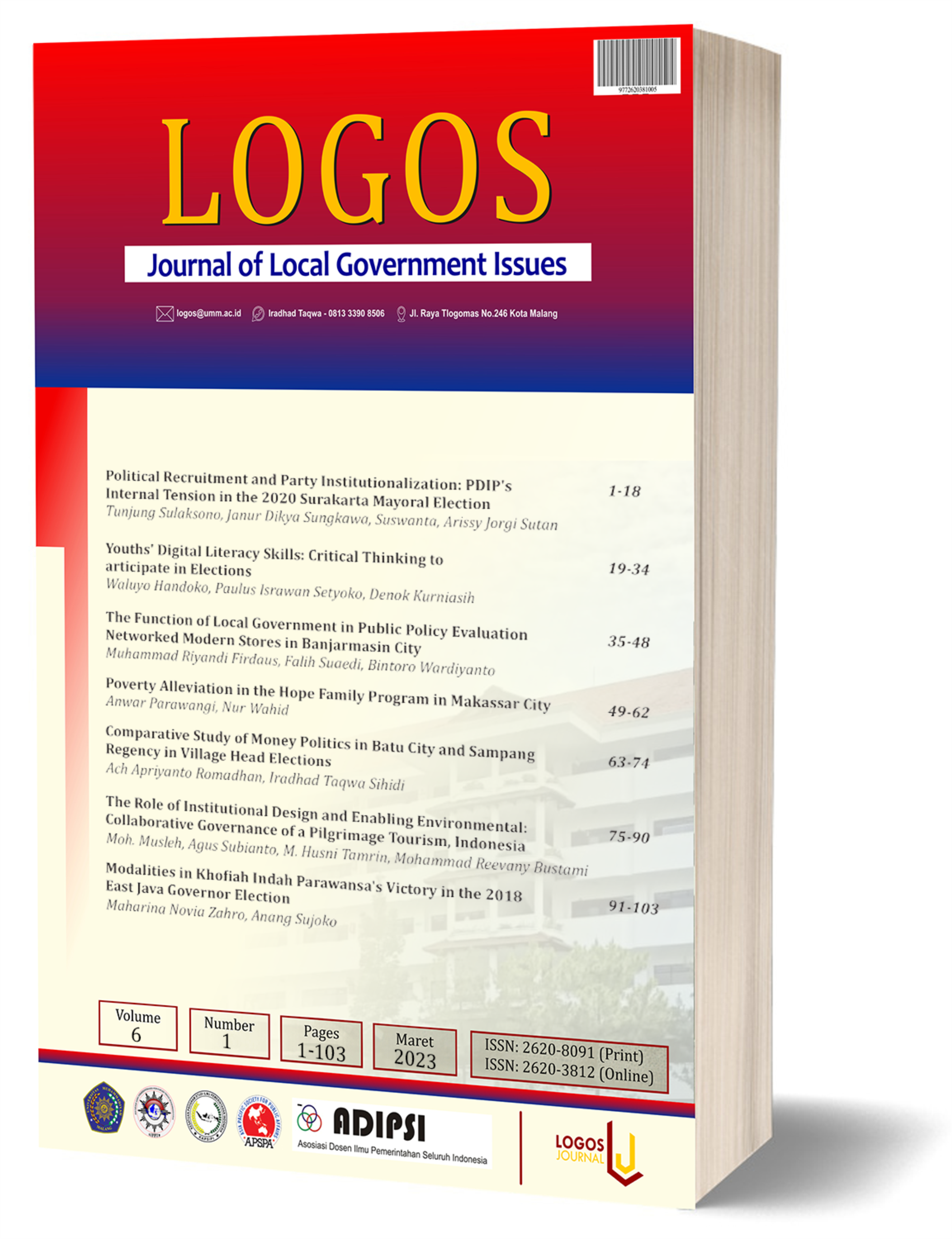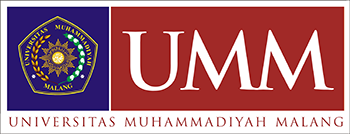The Function of Local Government in Public Policy Evaluation Networked Modern Stores in Banjarmasin City
DOI:
https://doi.org/10.22219/logos.v6i1.23214Keywords:
Public Policy Evaluation; Modern Store PoliciesAbstract
The presence of modern networked stores in the city of Banjarmasin causes traditional business actors to feel marginalized. The distance between establishments is such close operational times that are not following regulations, as well as partnerships and discourses on a moratorium on the establishment, are the causes of the underlying policies that have not run optimally. The purpose of this study is to explore and analyze policy evaluation through the role of actors, especially the Government, in protecting the existence of small-scale business actors behind the strong capitalist economic flows represented by modern networked stores. Indicators of the role of policies become new knowledge spaces in policy evaluation studies that will provide practical benefits for the Government in seeing the natural policy conditions behind the evaluation process, which is often carried out in formal conditions. This study uses a case study method with a qualitative research approach. The results show that policy evaluation is still not effective though the Regional Government as a critical actor has played its role in maintaining policy consistency so that competition between large investors represented through modern networked shops and small investors represented by micro, small and medium enterprises, and traders runs healthily. This paper argues that a consistent public policy will impact achieving the goals and objectives of the policy, only that an economic system based on capital, motives, and interests is another factor that influences the course of a evaluation public policy.
Downloads
References
Agustino, L. (2016). Dasar-Dasar Kebijakan Publik (Edisi Revisi). Bandung: Alfa Beta.
Akib, H., & Tarigan, A. (2008). Artikulasi Konsep Implementasi Kebijakan: Perspektif, Model dan Kriteria Pengukurannya. Jurnal.
Alfisyah. (2013). Dinamika Ekonomi Dan Perkembang Perdagangan Urang Banjar, 53(9). https://repo-dosen.ulm.ac.id//handle/123456789/8109
Anderson, J. E. (2003). Public Policymaking : an Introduction. Boston: Houghton, Mifflin Company.
Anggara, S. (2014). Kebijakan Publik. Kebijakan Publik. Bandung:Pustaka Setia
Araral, E., Fritzen, S., Howlett, M., Ramesh, M., & Wu, X. (2012). Routledge Handbook of Public Policy.. https://doi.org/10.4324/9780203097571
Bozeman, B., & Sarewitz, D. (2011). Public Value Mapping and Science Policy Evaluation. Minerva. https://doi.org/10.1007/s11024-011-9161-7
Deb, M., & Lomo-David, E. (2014). Evaluation of retail service quality using analytic hierarchy process. International Journal of Retail and Distribution Management, 42(6),521-541. https://doi.org/10.1108/IJRDM-12-2013-0217
Dunn, W. N. (2018). "Stage" theories of the policy process. In Handbook on Policy, Process, and Governing. https://doi.org/10.4337/9781784714871.00013
Dye, T. R. (2005). Understanding Public Policy. New Jersey: Prentice-Hall
Dye, T. R. (2016). Policy analysis. What governments Do, Why They Do It, and What Difference It Makes. Alabama: Universitas of Alabama Printing.
Easton, D. (1975). A Re-Assessment of the Concept of Political Support. British Journal of Political Science, 5(4), 435-457. https://doi.org/10.1017/S0007123400008309
Evans, L., & Kitchi, R. (2018). A Smart Place to Work? Big Data Systems, Labour, Control and Modern Retail Stores. New Technology, Work and Empolyement, 33(1), 44–57. https://doi.org/https://doi.org/10.1111/ntwe.12107
Fischer, F. (1995). Evaluating Public Policy. Chicago: Nelson-Hall Publishers.
Grindle, M. S. (2017). Politics and policy implementation in the third world. Politics and Policy Implementation in the Third World, 57(2),324-325.. https://doi.org/10.2307/2619175
Guy, C., & Bennison, D. (2002). Retail planning policy, superstore development, and retailer competition. In International Journal of Retail & Distribution Management, 30(9),431-434. https://doi.org/10.1108/09590550210438009
Handoyo, E. (2012). Kebijakan Publik. Semarang: Widya Karya.
Hill, M., & Varone, F. (2016). The Public Policy Process. Londong: Routledge https://doi.org/10.4324/9781315693965
Hoang, D., Barnes, C., & Munroe, O. (2019). Management of traditional retail markets in the UK: comparative case studies. International Journal of Retail and Distribution Management, 47(5), 530-531. https://doi.org/10.1108/IJRDM-04-2018-0079
Hogwood, B. W., & Gunn, L. A. (1984). Chapter 2: Analysing Public Policy. In Policy Analysis for the Real World. Oxford: Oxford University Press
Howlett, M., & Giest, S. (2015). Policy Cycle. International Encyclopedia of the Social & Behavioral Sciences: Second Edition, 288-292. https://doi.org/10.1016/B978-0-08-097086-8.75031-8
Kaliappan, S. R., Alavi, R., Abdullah, K., & Zakaullah, M. A. (2009). Liberalization of the retail sector and the economic impact of the entry of foreign hypermarkets on local retailers in Klang Valley, Malaysia. International Journal of Economics and Management.
Khan, A., Ahmed, S., & Arshad, F. (2019). Changing Preference Aspects from Traditional Stores to Modern Stores. International Conference on Management Science and Engineering Management, 694–704. https://doi.org/https://doi.org/10.1007/978-3-030-21255-1_53
Maruyama, M., & Trung, L. V. (2012). Modern Retailers in Transition Economies: The Case of Vietnam. In Journal of Macromarketing, 32(1), 31-51. https://doi.org/10.1177/0276146711421932
Miotto, A. P., & Parente, J. G. (2015). Retail evolution model in emerging markets: Apparel store formats in Brazil. International Journal of Retail and Distribution Management, 43(3), 242-260. https://doi.org/10.1108/IJRDM-03-2012-0025
Mishra, H. G., Sinha, P. K., & Koul, S. (2017). Customer Dependence and Customer Loyalty in Traditional and Modern Format Stores. Journal of Indian Business Research, 9(1), 59–78. https://doi.org/https://doi.org/10.1108/JIBR-12-2015-0126
Mukherjee, A. (2011). Fuelling India's Retail Boom - What Should Be the Right Policy? Advances in International Marketing, 21, 57-74. https://doi.org/10.1108/S1474-7979(2011)0000021006
Mulyadi, Deddy, (2016). Studi Kebijakan Publik dan Pelayanan Publik. Bandung: CV Alvabeta.
Nandonde, F. A., & Kuada, J. (2018). Perspectives of retailers and local food suppliers on the evolution of modern retail in Africa. British Food Journal, 120(2), 340-354. https://doi.org/10.1108/BFJ-02-2017-0094
Noordin, M. A. M. J., Maharimi, M. F., Ibrahim, Hamadi, I. L., Bahauddin, Khairuddin, M. R., & Bahaudin, A. (2022). Perceptions of Existing Small Business Retailers on the Emerging Modern Stores Design in Malaysia; Case Study Existing Small Fashion Retails Store in Georgetown, Penang. Financial Technology (FinTech), Entrepreneurship, and Business Development, 565–574. https://doi.org/https://doi.org/10.1007/978-3-031-08087-6_40
Nugroho, R. (2017). Public Policy: Dinamika Kebijakan, Analisis Kebijakan, dan Manajemen Politik Kebijakan Publik. Jakarta: Gramedia.
Nugroho, R. (2018). Membangun Kebijakan Publik Unggul Di Era Demokrasi. Jurnal Academia Praja, 1(02), 21-36.. https://doi.org/10.36859/jap.v1i02.63
Prayuga, H. E., Suryadi, B., & . J. (2019). Policy Implications of Modern Management Market and Retail Market In Traditional and Banjarmasin Grocery Traders. Saudi Journal of Engineering and Technology, 03(11). https://doi.org/10.36348/sjef.2019.v03i11.014
Renko, S., & Petljak, K. (2018). The secrets of the longevity of informal retail markets in Croatia. British Food Journal, 120(2), 325-339. https://doi.org/10.1108/BFJ-04-2017-0208
Sanderson, I. (2002). Evaluation, Policy Learning, and Evidence-Based Policymaking. Public Administration, 80(1),1-22. https://doi.org/10.1111/1467-9299.00292
Srimanee, Y., & Routray, J. K. (2012). The Fruit and Vegetable Marketing Chains in Thailand: Policy Impacts and Implications. International Journal of Retail & Distribution Management, 40(9), 656-675. https://doi.org/10.1108/09590551211255956
Suwitri, S. (2014). Analisis Kebijakan Publik. In: Konsep Dasar Kebijakan Publik. Jakarta: Universitas Terbuka.
Tumbe, C., & Krishnakumar, S. (2018). From bazaar to Big Bazaar: Environmental influences and service innovation in the evolution of retailing in India. Journal of Historical Research in Marketing, 10(3), 312-330. https://doi.org/10.1108/JHRM-12-2017-0078
Wang, K. (2018). Creating A Consumer Paradise: Department Stores And the Modern Urban Culture of Shanghai. Journal of Modern Chinese History, 12(2), 306–308. https://doi.org/https://doi.org/10.1080/17535654.2018.1542818
Wang, Y. (2020). Institutional interaction and decision making in China's rural development. Journal of Rural Studies, 76, 111-119. https://doi.org/10.1016/j.jrurstud.2020.04.023
Winarno, B. (2012). Kebijakan Publik (Teori, Proses, dan Studi Kasus). Yogyakarta: CAPS
Wiyarni, W. (2017). Traditional Market Accounting: Management or Financial Accounting? Asian Journal of Accounting Research, 2(1), 7-10 https://doi.org/10.1108/ajar-2017-02-01-b002
Yin, R. K. (2014). Case Study Research: Design And Methods (5th ed.). London: SAGE Publications.
Downloads
Published
How to Cite
Issue
Section
License
Copyright (c) 2023 Riyandi Muhammad Riyandi Firdaus

This work is licensed under a Creative Commons Attribution-ShareAlike 4.0 International License.
Authors who publish with this journal agree to the following terms:
- Authors retain copyright and grant the journal right of first publication with the work simultaneously licensed under a Creative Commons Attribution-ShareAlike 4.0 International License. that allows others to share the work with an acknowledgment of the work's authorship and initial publication in this journal.
- Authors are able to enter into separate, additional contractual arrangements for the non-exclusive distribution of the journal's published version of the work (e.g., post it to an institutional repository or publish it in a book), with an acknowledgment of its initial publication in this journal.
- Authors are permitted and encouraged to post their work online (e.g., in institutional repositories or on their website) prior to and during the submission process, as it can lead to productive exchanges, as well as earlier and greater citation of published work (See The Effect of Open Access).

This work is licensed under a Creative Commons Attribution-ShareAlike 4.0 International License.













